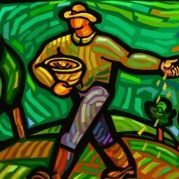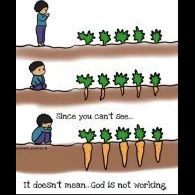Leaderboard
Popular Content
Showing content with the highest reputation since 06/15/2025 in all areas
-
This weekend a brother was sharing in First Corinthians. This morning (from a handout he gave) I saw the verse reference in 1 Corinthians 1:9: “You were called into fellowship* with His Son.” In chewing on this a bit, I started to get an appreciation for what this remarkable fellowship really is and includes. We have been brought into an astounding partnership and royal communication with the Father and with His Son . . . and with each other! What is this fellowship? We can think of it as an amazing and exclusive privilege (but also open to all who believe). Think of the grandest fellowship men come up with and multiply that by a kazillion, and we still won’t have what our Savior has brought us into! When we get togethers with others in this fellowship, we are able to enter into the highest communication in the universe! This has been freely given to us with all the privileges bestowed (as royalty and sons) and are fully ours. There is no higher fellowship and what a noble exchange now transpires between us! All we need to do is appreciate that His blood covers us and simply enter into the enjoyment and interaction afforded us in this fellowship. “And truly our fellowship is with the Father and with His Son.” (see 1st John 1) This is a corporate and highly interactive thing we are privileged now to be part of. All that is contained in this exceptionally wonderful fellowship is ours . . . and ours to share, enjoy and communicate all the glorious particulars with others in this fellowship! Thank you Lord for bringing us into this beyond amazing fellowship – help us appreciate and participate in what you’ve given us as members of your body!!! * Fellowship – Greek “koinonia” meaning partnership, contributory help, participation, sharing in, communion, a fellowship in spirit5 points
-
Church attendance is not an indicator of fruit. I understand that church attendance matters where religion is concerned, but the Body of Christ is found everywhere in the world. We are the temple of the Holy Spirit, not a structure built by men; the Lord does not dwell in structures made by man nor is He served by human hands (Acts 17:25).5 points
-
"For consider your calling, brothers: not many of you were wise according to worldly standards, not many were powerful, not many were of noble birth" "Instead, God chose things the world considers foolish in order to shame those who think they are wise. And he chose things that are powerless to shame those who are powerful" 1 Corinthians 1:26-27 God's ways vs man's ways..... Thanks Alive...4 points
-
The Calico cat is blind but she gets along just fine teasing her housemates. They are all rescues living in Istanbul with Onur of Adorable Paws rescue. He adopts disabled cats and feeds hundreds of stray cats and dogs. @Henry_iain @kwikphilly @other one @ladypeartree @JohnD4 points
-
Pretty much where I stand as well. Much like the timing of the rapture I feel like the nature of Hell is one of those things we can't really have certainty on so it's not worth getting into a heated debate over. An open minded discussion where people can be humble about their view points, sure. But as with most things the more participants the more likely it is that someone's "certain" about their perspective and things heat up. I trust God that whatever the exact nature of Hell is, it will be fair and just and make sense.4 points
-
There are several factors that bear upon this subject. For example, is eternity the end of time or time unending? Compounding this is the KJV translation of aionis as eternal is not as accurate as using "age lasting". The idea of conscious eternal torment has several points against it. 1. If we do not now have eternal life, but the gift of God is eternal life, why would this be given to unsaved people. How then could they be in hell forever without eternal life? 2. The unsaved are referred to a "perishing" and being destroyed. 3. Infinite conscious torment sounds unjust. 4. The effect of annihilation may be eternal but the consciousness may not be. 5. We are told that God is merciful and just. Conscious eternal torment sounds like neither. 6. The idea of conscious eternal torment may have entered Christian thinking through Augustine who may have been influenced by his Neo Platonist exposure. One might sound like he is defending God by amplifying hell. But one has to ask ih God is truly honored through misrepresentation.4 points
-
Not all who leave a "church" have left the "church". Many view "church" as a building and the pastor that preaches sermons in it. Others view "church" as corporate entity with a headquarters and satellite offices, with by-laws and standing orders, rules and regulations for members only, etc. Neither of the foregoing is the church, the ekklessia, the body of believers called out from the world into the body of Christ. Many so-called "churches" have become cults, and many more are cult-like, hanging onto the teachings of so-called "pastors" that don't teach the pure word of the Bible, but teach and preach to the current culture and teach and preach so as not to violate the 501(c)(3) tax exempt status they hold so near and dear to their hearts. No one that is part of the body of Christ, the true ekklesia, has left the body of Christ, because all that are in the body of Christ are sealed with the Holy Spirit of promise, and no one can pluck them out of God's hand. They may have left a 501(c)(3) entity that pretends to be representing God and pretends to be teaching and preaching God's word, but they have not left the ekklesia body of Christ. Peace4 points
-
"what if falling church numbers is a good thing?" Well that is a matter of perspective...@Ghostdog...most won't even realize it and few actually care, for reasons they believe are just. Some do it to escape the pure foolery that their church has become as it tries to attain relevance in their culture. Other's...those who are looking for the "Body of Christ" and they will find it...they must leave...they are being "called out." A large portion of "Christianity" as a whole...referencing the entire "denominational empire"...sees this as something that happens to "the others"...the heretics, rebellious, unbelieving...largely after "they" are "gone?" Perhaps an accurate definition of "church" may be in order here? On top of that...Paul made it prophetically clear that some element of this "must" happen...so it will happen...and it is happening and will continue yet for a while. I am referencing the "falling away"...the "departure." For some...it will be like the Jews who departed from the law and Moses...which had become "anáthema"...and came to Yahshua Christ. "Now we request you, brethren, with regard to the coming of our Lord Jesus Christ and our gathering together to Him, that you not be quickly shaken from your composure or be disturbed either by a spirit or a message or a letter as if from us, to the effect that the day of the Lord has come. Let no one in any way deceive you, for it will not come unless the apostasy comes first, and the man of lawlessness is revealed, the son of destruction, who opposes and exalts himself above every so-called god or object of worship, so that he takes his seat in the temple of God, displaying himself as being God. Do you not remember that while I was still with you, I was telling you these things?" 2nd Thessalonians 2:1-5 NASB This could be an eye opening discussion? Tatwo...:)4 points
-
Also high intelligence has nothing to do with spiritual growth…if anything it can hinder it until dealt with.3 points
-
I hear you and have enjoyed this conversation. You asked where in Scripture does it say Jesus was like Adam? Well, Paul called Jesus "The Last Adam" in 1 Corinthians 15:45. Remember, it was through Adam's disobedience that sin entered the world. So to it be through Jesus' obedience that we have eternal life. If Adam would have been obedient to God's voice, sin and death would have never entered the world. So the Son of God became a man, He became like Adam, to accomplish this obedience.3 points
-
Not that much, only about a dozen times. Daily...... Yes, to whom much is given, much is required. I'm blessed beyond measure, to God the Glory.. If I focus on the problems, they usually get worse. (In my mind at least) If I see (faith) it could have been worse, and how blessed I actually am, I receive a grateful peace, thankfulness. "Then I saw a man with no feet".... We're in the army of God. Boot camp, till graduation, as the day approaches. It's supposed to be tough. And I thought Marine Corps boot camp was tough....(God wants a few good women/men) Thanks Michael...3 points
-
I always believed revivals come from God above and not Believers trying to work themselves up emotionally.3 points
-
An interesting topic which has come up on here a few ties recently. I am not dogmatic in my belief one way or the other. I've had some fellowship with local brothers about it, and our conclusion is that it is not easy to determine 100% . . . but bottom-line, whatever "hell" is, it is to be avoided at all costs and we should be zealous to others as much. The best writing I've seen on this is by Steve Gregg, who wrote a book called, "All you want to know about hell - The Three Christian Views" All You Want to Know About Hell: Three Christian Views of God's Final Solution to the Problem of Sin: Gregg, Steve: 9781401678302: Amazon.com: Books I found this book quite in depth as he goes into each and even compares the three, gives their history, etc. He doesn't put forth his own view, and says that even what he thinks could very well be wrong - I really respected that! (personally, I sort of loosely hold something of a hybrid of a couple of these views)3 points
-
most animals use the sense of smell more than sight so blindness is not the handicap it would be to us3 points
-
For decades, many have thought that some kind of super computer would be used by antichrist to subjugate humans. Now, with the rapidly increasing capabilities of AI, this would appear more and more likely. And I've been watching, with fascination, the advancements in the coupling of computers and biology . . . that is, moving toward the ability of humans to be directly connected with electronics and by extension, the internet. If this bio/electronic link was perfected (think Borg), imagine the incredible power inherent in that - streaming internet and immense computing power one with a human brain! So does this fit with Revelation 13:15? "The second beast was given power to give breath to the image of the first beast, so that the image could speak and cause all who refused to worship the image to be killed." I dunno2 points
-
Yes we are, and it's all because of Him and who He has made us! Consider these verses: "It is of God that you are in Christ Jesus!" 1 Cor 1:30 "The glory You have given Me, I have given to them!" John 17:22 "All things are yours, whether death or life or things present or things to come - and you are Christ's and Christ is God's." 1 Cor 3:21-22 "And he (overcomer) will shepherd them (nations) with a rod of iron!" Rev 2:26 "Do you not know that we will judge the world . . . [and] angels?" 1 Cor 6:2-3 "Let us make man in Our image . . . and let them have dominion over every . . ." Gen 1:26 "He shall crush your head and you will bruise His heel" "The God of peace will crush Satan under your feet shortly." Genesis 3:15 & Romans 16:20 Because we are in Christ and Christ is in us, we are in total union with Him. In Him we have dominion and authority as the "many sons [being brought] into glory" and are rightful heirs of The King! And the King, through us, will do what He needs to do on this earth!2 points
-
This brings the discussion back into focus regarding the topic at hand. Forgiveness is not an issue here but rather, the mercy of the Lord toward man --- specifically, wicked and even unrepentant men and women. Scripture demonstrates that the Lord regards man differently than He does the angels; man is afforded repentance and mercy (proving his special status) but the same is not true of those angels who left their first estate. There is no mercy nor opportunity to repent for them. The condemned of man are still afforded mercy by the Lord in that they shall not live eternally. Eternal torment is reserved for those who do not die. Man, on the other hand, dies at least once. This is the contextual basis of my view regarding the disposition of the dead (man alone) who will be cast into the lake of fire. It is the second death... immutable and final and thus, eternal. The second death is not death if the condemned are living eternally.2 points
-
It's no wonder that the man with the highest recorded IQ is a believer in Jesus Christ. https://www.thegatewaypundit.com/2025/06/worlds-highest-iq-holder-says-he-believes-jesus/2 points
-
Yes, not many! Those things are not that important in the big (aka God's) scheme of things. So someone has even a 100 more points than another on the IQ scale - what does that mean to Him (who has an IQ of a kazillion)? Besides it is the spirit that gives life . . .2 points
-
I agree for the most part, although I could see where AI could be used in deception which will be crazy during that time according to Revelation, etc. It might have a greater role than we know right now. We'll have to wait and see how it plays out. A few thoughts which are probably not worth a lot, but here goes: 1. The Mark of the Beast (MOB) seems to have a strong worship (or loyalty) component attached to it. It sounds like some will accept this mark willingly what ever it turns out to be. 2. In order to install a "new" world system the old one has to fail. Possibly in a loud, obnoxious, messy manner. Things have to be bad enough for people to go along with the new system being set up. I think we're seeing some of the cracks in the old system starting to widen. Do I have a time table? Nope. I have no better idea than anyone else - but it does look like the stage is being set for something. 3. Jesus used the phrase "sheep without a shepherd" to describe to nation of Israel of His day. That sounds like a great description for our time as well. Once the economy crashes and all that comes with it folks will be looking for someone to fix the whole mess. The person who can do this will have no issue getting people to do whatever he wants - and there will be some who will idolize him without being told to. Politics today seems to be getting really ripe for this. Anyway. Just a few random ideas on my part.2 points
-
I think these verses connect the Word written to individual readers: Individually addressed 'any man' held individually accountable for what is written to them... John 12:46 (KJV) [46] I am come a light into the world, that whosoever believeth on me should not abide in darkness. [47] And if any man hear my words, and believe not, I judge him not: for I came not to judge the world, but to save the world. [48] He that rejecteth me, and receiveth not my words, hath one that judgeth him: the word that I have spoken, the same shall judge him in the last day. [49] For I have not spoken of myself; but the Father which sent me, he gave me a commandment, what I should say, and what I should speak. [50] And I know that his commandment is life everlasting: whatsoever I speak therefore, even as the Father said unto me, so I speak. Individual sanctification through Word John 17:17 (KJV) [17] Sanctify them through thy truth: thy word is truth. [18] As thou hast sent me into the world, even so have I also sent them into the world. [19] And for their sakes I sanctify myself, that they also might be sanctified through the truth. [20] Neither pray I for these alone, but for them also which shall believe on me through their word; [21] That they all may be one; as thou, Father, art in me, and I in thee, that they also may be one in us: that the world may believe that thou hast sent me. Specific to each individual the Word was written: 2 Timothy 3:15 (KJV) [15] And that from a child thou hast known the holy scriptures, which are able to make thee wise unto salvation through faith which is in Christ Jesus. [16] All scripture is given by inspiration of God, and is profitable for doctrine, for reproof, for correction, for instruction in righteousness: [17] That the man of God may be perfect, throughly furnished unto all good works.2 points
-
When I think of Christ working "through" me rather than "in" me this scripture comes to mind ... Joh 3:30 He must increase, but I must decrease. Joh 3:31 He that cometh from above is above all: he that is of the earth is earthly, and speaketh of the earth: he that cometh from heaven is above all. Php 2:11 And that every tongue should confess that Jesus Christ is Lord, to the glory of God the Father. Lights in the World Php 2:12 Wherefore, my beloved, as ye have always obeyed, not as in my presence only, but now much more in my absence, work out your own salvation with fear and trembling. Php 2:13 For it is God which worketh in you both to will and to do of his good pleasure. This insures that "through" Christ God gets all the glory.2 points
-
Psalm 139:14 is one that's always resonated with me. "I praise you, for I am fearfully and wonderfully made. Wonderful are your works; my soul knows it very well."2 points
-
2 points
-
No. I did not say nor imply the beast is here on Earth yet. However, since you brought it up, given all the biblical end-time indicators, I suspect he is, but I do not know that for a fact.2 points
-
I am nothing without Christ, however, quote: I am faithful (Ephesians 1:1). I am God’s child (John 1:12). I have been justified (Romans 5:1). I am Christ’s friend (John 15:15). I belong to God (1 Corinthians 6:20). I am a member of Christ’s Body (1 Corinthians 12:27). I am assured all things work together for good (Romans 8:28) . I have been established, anointed and sealed by God (2 Corinthians 1:21-22). I am confident that God will perfect the work He has begun in me (Philippians 1:6). I am a citizen of heaven (Philippians 3:20). I am hidden with Christ in God (Colossians 3:3). I have not been given a spirit of fear, but of power, love and self-discipline (2 Timothy 1:7). I am born of God and the evil one cannot touch me (1 John 5:18). I am blessed in the heavenly realms with every spiritual blessing (Ephesians 1:3). I am chosen before the creation of the world (Ephesians 1:4, 11). I am holy and blameless (Ephesians 1:4). I am adopted as his child (Ephesians 1:5). I am given God’s glorious grace lavishly and without restriction (Ephesians 1:5,8). I am in Him (Ephesians 1:7; 1 Corinthians 1:30). I have redemption (Ephesians 1:8). I am forgiven (Ephesians 1:8; Colossians 1:14). I have purpose (Ephesians 1:9 & 3:11). I have hope (Ephesians 1:12). I am included (Ephesians 1:13). I am sealed with the promised Holy Spirit (Ephesians 1:13). I am a saint (Ephesians 1:18). I am the salt and light of the earth (Matthew 5:13-14). I have been chosen and God desires me to bear fruit (John 15:1,5). I am a personal witness of Jesus Christ (Acts 1:8). I am God’s co-worker (2 Corinthians 6:1). I am a minister of reconciliation (2 Corinthians 5:17-20). I am alive with Christ (Ephesians 2:5). I am raised up with Christ (Ephesians 2:6; Colossians 2:12). I am seated with Christ in the heavenly realms (Ephesians 2:6). I have been shown the incomparable riches of God’s grace (Ephesians 2:7). God has expressed His kindness to me (Ephesians 2:7). I am God’s workmanship (Ephesians 2:10). I have been brought near to God through Christ’s blood (Ephesians 2:13). I have peace (Ephesians 2:14). I have access to the Father (Ephesians 2:18). I am a member of God’s household (Ephesians 2:19). I am secure (Ephesians 2:20). I am a holy temple (Ephesians 2:21; 1 Corinthians 6:19). I am a dwelling for the Holy Spirit (Ephesians 2:22). I share in the promise of Christ Jesus (Ephesians 3:6). God’s power works through me (Ephesians 3:7). I can approach God with freedom and confidence (Ephesians 3:12). I know there is a purpose for my sufferings (Ephesians 3:13). I can grasp how wide, long, high and deep Christ’s love is (Ephesians 3:18). I am completed by God (Ephesians 3:19). I can bring glory to God (Ephesians 3:21). I have been called (Ephesians 4:1; 2 Timothy 1:9). I can be humble, gentle, patient and lovingly tolerant of others (Ephesians 4:2). I can mature spiritually (Ephesians 4:15). I can be certain of God’s truths and the lifestyle that He has called me to (Ephesians 4:17). I can have a new attitude and a new lifestyle (Ephesians 4:21-32). I can be kind and compassionate to others (Ephesians 4:32). I can forgive others (Ephesians 4:32). I am a light to others and can exhibit goodness, righteousness and truth (Ephesians 5:8-9). I can understand what God’s will is (Ephesians 5:17). I can give thanks for everything (Ephesians 5:20). I don’t have to always have my own agenda (Ephesians 5:21). I can honour God through marriage (Ephesians 5:22-33). I can parent my children with composure (Ephesians 6:4). I can be strong (Ephesians 6:10). I have God’s power (Ephesians 6:10). I can stand firm in the day of evil (Ephesians 6:13). I am dead to sin (Romans 1:12). I am not alone (Hebrews 13:5). I am growing (Colossians 2:7). I am His disciple (John 13:15). I am prayed for by Jesus Christ (John 17:20-23). I am united with other believers (John 17:20-23). I am not in want (Philippians 4:19). I possess the mind of Christ (I Corinthians 2:16). I am promised eternal life (John 6:47). I am promised a full life (John 10:10). I am victorious (I John 5:4). My heart and mind is protected with God’s peace (Philippians 4:7). I am chosen and dearly loved (Colossians 3:12). I am blameless (I Corinthians 1:8). I am set free (Romans 8:2; John 8:32). I am crucified with Christ (Galatians 2:20). I am a light in the world (Matthew 5:14). I am more than a conqueror (Romans 8:37). I am the righteousness of God (2 Corinthians 5:21). I am safe (I John 5:18). I am part of God’s kingdom (Revelation 1:6). I am healed from sin (I Peter 2:24). I am no longer condemned (Romans 8:1, 2). I am not helpless (Philippians 4:13). I am overcoming (I John 4:4). I am persevering (Philippians 3:14). I am protected (John 10:28). I am born again (I Peter 1:23). I am a new creation (2 Corinthians 5:17). I am delivered (Colossians 1:13). I am redeemed from the curse of the law (Galatians 3:13). I am qualified to share in His inheritance (Colossians 1:12). I am victorious (1 Corinthians 15:57).2 points
-
2 points
-
There's stuff going on right now that is deserving of God's Wrath. On-screen images appear to be animated, but how was John to describe what he was seeing? Obviously there is a dictator involved, maybe a democratically elected one, with power from the throne of Satan to exercise great authority through the media. Rev 13:15-18 He was granted power to give breath to the image of the beast, that the image of the beast should both speak and cause as many as would not worship the image of the beast to be killed. (16) He causes all, both small and great, rich and poor, free and slave, to receive a mark on their right hand or on their foreheads, (17) and that no one may buy or sell except one who has the mark or the name of the beast, or the number of his name. (18) Here is wisdom. Let him who has understanding calculate the number of the beast, for it is the number of a man: His number is 666.2 points
-
Ai is touted as the new electricity, in other words, indispensable and part of everyday life. AI is being implemented, refined, and expanded everywhere, taking away good paying blue-collar jobs, Amazon making the latest significant switch. The Bible implies commercialism and consumerism are on steroids during the end times. I envision two distinct Mystery Babylon’s, commercial Babylon, and spiritual Babylon. It is almost undisputed one man will be controlling commerce and all buying and selling, the Antichrist. An Army of people or any algorithm can not approve or disapprove instant approval or disapproval of goods or services. I envision the damnable mark of the beast as a type of religious social credit score, you are either connected into the system, or not. There will not be legal cash or fiat paper tender for any transactions. We see the implementation of a global cashless world as we speak, everyone is reduced to digital ones and zeroes. The Beast system has developed right before our eyes, in this generation. I have been Chicken Little on AI for many years, and more pieces of the sky are falling by the day.2 points
-
Yes…it’s true, but perhaps a time is coming where a clear choice will be available as to where loyalty is placed with a consequence other than in N. Korea. Of course, I do not know, but it seems to me that men will remain as they are up to the end of the age. I also believe Psalm 2 is prophetic and has the already but not yet facet, as does most prophecy…and points to the last of this age.2 points
-
And I also think the mark of the beast might have something to do with humans merging with artificial intelligence. Essentially such a person would become a cyborg. I figure at that point, a cyborg would no longer be able or be interesting in receiving Jesus into their heart. Their whole way of thinking would be altered. I kind of look at it like I saw the Nephilim. Taking the mark (fusing with technology) basically transforms you into another race of being. You would no longer be the creature God created, but are now an abomination. One more thing I think about concerning image of the beast, is that technology and artificial intelligence is a man made conception. God created the universe and the earth. God is King over all, thus His name is very great! Man on the other hand has join in the rebellion of the devil, the one who wanted to take God's position. And when we look at the incident with the Tower of Babel, man wanted to make a name for himself. So they disobeyed God's order to spread on the earth, and came together in one spot. And instead of using natural (God made) building materials, they made bricks. (Genesis 11:3) So I see artificial intelligence and the technology associated with it, like I do these bricks in Genesis 11:3. It is man's attempt to make a name for themselves, creating this technological form of life. Then once we fuse with it, we become a hideous form of life, that God has nothing to do with.2 points
-
Maybe, but even if not, the way economies around the world are currently imploding, it looks like they are going to have initiate something to keep things going.2 points
-
2 points
-
A quick word of warning before I go to church this morning..... Learning to hear the voice of the Holy Spirit clearly has always been important.... BUT as we are traveling these last days it becomes ever so much more important.... They are many reasons why..... but let me give you one of them! **WARNING** If you listen to online message, specially on YouTube, then this warning is for you..... People are using AI to mimic famous preachers and creating message and things that they "supposedly said" that they never would say. And the technology is getting better and better, it is harder and harder to tell, and soon impossible to tell the difference from AI voice to real voice (just listen to the songs I've created, they are all AI voices!) So its ever so important to know the Word so you are not deceived even by the voice of a preacher you trust. And to hear clearly the Holy Spirit that will warn you.... "it's not real". God bless you all greatly.2 points
-
The Future Human Man, The Antichrist Seen Below In (Daniel) 11:37 Will Be A Hebrew/Jew In Decent, His Fathers Worshipped The True Hebrew (God Of His Fathers) (Daniel) 11:37KJV 37 Neither shall he regard the God of his fathers, nor the desire of women, nor regard any god: for he shall magnify himself above all. Examples: God Of His Fathers (2 Kings) 21:22KJV 22 And he forsook the Lord God of his fathers, and walked not in the way of the Lord. (2 Chronicles) 21:10KJV 10 So the Edomites revolted from under the hand of Judah unto this day. The same time also did Libnah revolt from under his hand; because he had forsaken the Lord God of his fathers.2 points
-
Look, I understand your take on Daniel and your take on the Roman Catholic church, and it's safe to say it's a dispensational take that your echoing, a take that is based on assumptions that are made by most if not all dispensationalists. I don't view the Bible through a dispensational lens, though I used to before I began to study the Bible in earnest, without the dispensational notes that I was indoctrinated into believing one must follow in order to for scripture to make sense. You can point to all the things the RCC has done wrong that makes you think it is beast of Daniel and Revelation. But in doing so, you are dismissing that the RCC, for all its faults, has never not taught that Christ came in the flesh, that Christ is God incarnate, and that Christ was crucified buried and resurrected from the dead so that whoever believes in Him should not perish but have everlasting life. And because the RCC has never not taught those things, the RCC cannot be the beast of Daniel 7 or of Revelation 13 and 17. Peace2 points
-
Bible In Basic English Mat 6:33 But let your first care be for his kingdom and his righteousness; and all these other things will be given to you in addition. Contemporary English Version Mat 6:33 But more than anything else, put God's work first and do what he wants. Then the other things will be yours as well. New King James Version Mat 6:33 But seek first the kingdom of God and His righteousness, and all these things shall be added to you. "Where do these problems come from? They are frustrating. They are annoying. Give me a break, please LORD." Have you ever prayed like that? In 2 Corinthians 11 the Apostle Paul lists "the daily care of the ekklesias" as one of the things that pressed on him. 2Co 11:28 Apart from these external trials, I face daily the pressure of my concern for all the ekklesias. I too feel concern for all the ekklesias, and this comes from my observations and experiences as a much pruned branch of the Vine. But why should I care? Why not let things run their course, even if they are not in accord with God's Kingdom and His Righteousness? Putting God's Kingdom and His Righteousness first is not a popular concept among those who have the world and its ways firmly at the top of their agenda, but every Christian should rate all their interests, issues, and concerns below God's Work and His Will. Keep blessing those who underrate you, and be sure not to become spiritually dehydrated, Amen.2 points
-
2 Kings 2:14 Then he took the mantle of Elijah that had fallen from him, and struck the water, and said, “Where is the LORD God of Elijah?” And when he also had struck the water, it was divided this way and that; and Elisha crossed over. Over the past few years, some leaders who once inspired many have fallen into scandals that have brought harm and confusion to the body of Christ. In moments like these, it’s easy to feel disillusioned or lost, as if the work of God depends on human vessels who have failed us. But I’m reminded of how Elisha responded when Elijah was taken from him. His eyes were not on the departing servant but on the living God. “Where is the Lord God of Elijah?” he cried — not, “Where is Elijah?” That cry holds a lesson for us today: our hope and strength are not in human leaders, but in the God who works through them—and who remains faithful even when men falter. Elisha’s heart longed for the God who had empowered Elijah–the God who shuts the heavens, calls down fire, feeds the hungry through ravens, and defends His name before kings and nations. Mighty acts of faith marked Elijah’s life because his confidence rested in the Almighty, not in himself. And when his race was run, God’s power was no less present, no less ready to act, no less able to raise up a new servant and continue His work. The God of Elijah is the God of life and death, of judgment and mercy, of fire and rain, of heaven and earth — and He is unchanged today. When Elisha stepped forward, he met his first obstacle — the swollen Jordan, barring his way. But he did not shrink back. He lifted Elijah’s mantle, struck the water, and cried out, “Where is the Lord God of Elijah?” And the God of Elijah answered. The river parted. The path opened. And Elisha stepped into his calling. So it will be for us. When our Jordans rise up, when leaders disappoint, when challenges seem insurmountable, let our hearts cry not for men, but for the God who never fails. The God of Elisha revealed Himself not just in mighty acts, but in tender mercies — healing poisoned waters (2 Kings 2:19-22), multiplying a widow’s oil (2 Kings 4:1-7), feeding a multitude (2 Kings 4:42-44), restoring the dead to life (2 Kings 4:18-37), making iron float (2 Kings 6:1-7). This is the God who steps into our kitchens and workshops, our debts and needs, our hidden battles and silent cries. He is as present in the ordinary as in the extraordinary, as near in our weakness as in our victories. Beloved, today God calls us to lift our eyes from men to Himself. Leaders may fall, heroes may stumble, but the Lord God of Elijah and Elisha remains. He is the same yesterday, today, and forever. He waits for us to trust Him afresh, to cry out for His presence, to believe in His power — not in our strength, not in human vessels, but in Him alone. View the full article2 points
-
@Michael37 As to praying about difficulties in that way? Absolutely! I find the more I'm brutally honest with Him the better. My thought on pursuing first the kingdom of God and His righteousness is that these are really both just Christ Himself. He has the authority and He is our righteousness, so if I'm pursuing Him and abiding in His Spirit, then all these things are there and all is added as needed. (reminds me of the title of an old book, "The All-Inclusive Christ")2 points
-
Jesus references Hell ( improperly translated) which is Gehenna a reference to the Valley of Hinnom outside Jerusalem to the south, where babies were sacrificed and thrown in the worship of 'molech'. King Josiah put a stop to this practice (2 Kings's 23:10). It came to be the place where human excrement and rubbish and animal carcasses were disposed of and burned. The fires there burned continually. It was used symbolically of the place of punishment. Jesus of course was aware of how it was viewed by the people He was speaking to. It was a dump where dead things ended up. Was Jesus teaching Ancient Greek poetry and beliefs on death? No! Of course not. He was referencing something everyone knew, as a symbolism. He was not revealing anything substantial about the reality of life after death imagined by the Hellenized Jews. Isaiah references it here. Is. 66:24 (ESVS) “And they shall go out and look on the dead bodies of the men who have rebelled against me. For their worm shall not die, their fire shall not be quenched, and they shall be an abhorrence to all flesh.”. In the next age--even death itself will die.2 points
-
A metaphor--did the Lord advocate cutting off your foot or plucking out your eye--knowing full well that all men sin--even His own.2 points
-
Our inheritance is heaven, enjoying the Lord our God and all the treasures He has stored up for us, for all eternity. (1 Peter 1:4; Matthew 6:19-20).2 points
-
I hear your points. Concerning the third one, I suppose we can't put too much weight on what sounds just to us. Even when we look at human justice systems, there are those who agree with the death penalty and those who do not. Even if annihilation is correct, it's not going to be a bearable experience. Whatever the punishment is, it's going to be worse than the electric chair. It's going to be worse than being crucified. It's going to be worse than the most torturous thing human kind has ever done to another human being. The reason why I say this is because the righteous have gone through some pretty terrible things here on earth at the hands of the wicked. And just living on this earth as it is, has been very torturous for many. (All the sicknesses and diseases. For some, the only thing they have known in their ever day lives is pain) All these things were done to the body. Yet with God's punishment of the wicked, it will be done both to the body and their souls. And again, when it comes to the devil's punishment, perhaps his will last forever. Revelation 20:10 uses the combination of the Greek words "eis" and "aiōnōn", which can be literally translated as "the ages of the ages". This indicates no matter how many ages there are from that point, the devil will be suffering in all of them. I also think about Jesus sayings concerning the three cities He spoke woe over, that it would be more bearable for the cities of Sodom and Gomorrah in the day of judgment than it will be for them. Jesus also said for the one who knew his master's will yet didn't do it, would receive many blows, versus the one who didn't know the will of the master but did things deserving of punishment. Now, many and few blows indicates a certain number. Implying once that number is reached, there will be no more blows or whippings. This could indicate annihilation, where some will last longer in the fire than others.2 points
-
Difficult. Decisions made with this in mind inevitably lead to various trials. At the same time, we learn to trust the Lord to direct our paths on an individual level and His will be done in the big picture. It can also be easy, as He provides and gives Peace. All three.2 points
-
@lrs68Paul was 'an apostle of Jesus Christ by the will of God; (Ephesians 1.1); so it wasn't a Pauline church or a Gentile church that he promoted. In 1 Corinthians 10.32 Paul speaks of Jews, Gentiles and the church of God: this church is comprised of people converted by grace to Christ from both Jewish and Gentile backgrounds.2 points
-
Have you ever been to Turkey? It's Cat Paradise- boy do the people of Turkey love their cats.....you'll see feeding stations and lounging areas throughout the Cities for the Strays of Turkey - taken care of by no one but by very one The only unfortunate thing is becsuse of the peoples reverence for cats they are pretty nonchalant about spaying & neutering so there's an ever increasing population of cats that extend out into some very poor sections where the provisions are slim---- I'm not sure why rescuers are not focused on those areas but like everywhere,the worst parts of town get most overlooked I also enjoy Cairo as well- many modern Egyptions still have a great reverence for cats,some even believe they are sacred animals - same thing as Turkey,the poor are very poor ...... they need help for the people and the stray cats (& dogs)would be well cared for Unlike the USA-strays are very overlooked,so are homeless people - in plain sight yet invisible to most2 points
-
First "what if" is doubting.. get rid of lukewarm? His Chruch is always growing.. anything everything God does.. grows always. If ever we fail to see that or start to doubt.. 12 men and some women and then 120, 3000 and today. One group.. just one ministry in 2024 seen 30 million come to Christ just one ministry. That branch that seems to have less fruit or none.. what they have always done for thousands of years is put push it up so it gets more light. As for lukewarm no where does it say they are not saved they are lost nor says He has spit them out. About to. Not sure why we tend go to the negative allot of the times... man I have. That Church I think they listen and repented as He told them to. Chruch.. we still look at some building and the world will look at the numbers but with GOD that's not the Church. I'm seeing that Church grow bigger then every before. I mean so many young people.. what do we focusing on? Ever try to talk to Him with doubt? Its faith with Him the only way to please Him. He calls those things that be not as though they were. We really need to start after 2000 years now is talk like Him. What is faith? Not what you see or feel. We walk by faith "For we walk by faith, not by sight" we live by faith "I have been crucified with Christ; it is no longer I who live, but Christ lives in me; and the life which I now live in the flesh I live by faith in the Son of God, who loved me and gave Himself for me.". We live by the spirit and walk in the spirit "Since we live by the Spirit, let us also walk by the Spirit" To think the great tribulation.. no matter how you look at that its after.. its all the people from just the great tribulation which will be worse then this world has ever seen yet the number of them no one could number.. they came out of the great tribulation "After these things I looked, and behold, a great multitude which no one could number, of all nations, tribes, peoples, and tongues, standing before the throne and before the Lamb, clothed with white robes, with palm branches in their hands," “These are the ones who come out of the great tribulation, and washed their robes and made them white in the blood of the Lamb.' man I don't care.. shouting TIME.. I am all in.. shouting.. great is the LAMB!2 points
-
A big amen to this, though I'll add one thing to it. Something I've learned to be wary of is when situations arise where fleshly desires would seem to align with God's desires. It may seem to be weird at first thought, but does happen sometimes. The most clean cut and obvious example I can think of is our relationships with unbelievers, especially when they take a turn for the romantic or involve family. We know God wants all to be saved, and we should long for others to be saved as well. The thing is the amount of personal involvement can really lead to a lot of mistakes and unproductive or counterproductive heartache. It really pays to self examine and seek the guidance of fellow believers who are mature and discerning, because when a high level of personal involvement is involved it can be one of the hardest things to discern our own will from God's and to know when to step back or step away.2 points
-
The Olivet discourse found in Matthew Chapter 24 is the testing ground for determining a preterist My belief is a "Futurist" A.) "Futurist" believe all three mentioned below are future unfulfilled, such as myself B.) "Partial Preterist" believe items 1 & 2 have been fulfilled in the 70AD destruction of Jerusalem by Roman armies C.) "Full Preterist" believe all 3 items have been fulfilled 1.) Matt 24:15 Daniel's AOD 2.) Matt 24:21 The Great Tribulation 3.) Matt 24:29-31 The Second Coming1 point
-
I think the Jews failed not Jesus. They failed so he could offer it too us. Did he plan things that way or did he just change his mind after they didn't accept him.1 point

















.thumb.jpg.78a316778a2b75f1377c52957d74a45f.jpg)


.thumb.jpg.59eed8b93aa1c92d8b306f10811981dc.jpg)

